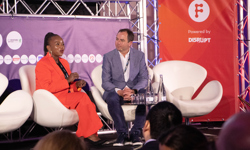While everybody else was chasing the big guns, Think Publishing set itself up to cater to the clients who tended to be overlooked by the contract publishing sector in the early days. Now, fifteen years on, Think has become a specialist publisher catering primarily to membership organisations, and has been expanding into new media and formats that help its clients reach their members.
CEO and founder Ian McAuliffe says the company does “what it says on the tin. We are a membership communications agency. That’s what we’ve defined ourselves as, going one step further than perhaps some of the other publishing agencies,” he says.
“We specialise in publishing and all the things around publishing that are associated with it, so that’s sponsorship, events, exhibitions, digital, and email for membership clients. We do have a few traditional customer publishing clients, like First Great Western and the Preferred Hotels Group and others, but we specialise in membership and that’s one of our key differences.”
Co-founder Tilly Boulter brought marketing and PR know-how to the mix, along with strategic thinking and a passion for the value of giving the company a focus, and specialising in something.
At the time Think was launched, most of the UK’s contract publishers, as they were then called, were chasing the same prestigious clients – names like John Lewis, Marks & Spencer and Asda – and slashing costs to be competitive. “As a result, it was the big blue chip clients that were getting all the time and attention of the top staff, and there was a whole other tier of clients – charities and membership organisations – that were being given to junior staff,” says McAuliffe. “So, we set the company up basically to cater for a different market that had been less well served.”
Think’s first client was Zac Goldsmith, the journalist and politician who is now in the race to become the next mayor of London. The Goldsmith family owned the title The Ecologist, and appointed Think to publish it. Success with The Ecologist led to growth in the environmental and charitable sectors, and Think started publishing titles for the Royal Geographic Society, the Soil Association and clients with a similar environmental focus.
“It would be lovely to say that it was all strategic, but it was a happy accident,” says McAuliffe. “At the time, obviously the environmental movement was huge, so a lot of our clients suddenly started getting budgets and growth in membership.”
From there, Think moved into serving a wider range of membership organisations. It publishes Beer, for the Campaign for Real Ale, which has won a host of publishing awards, including the IPN PPA Membership Magazine of the Year in 2015. “We helped them really change their membership base from an older, male demographic into a younger male-female demographic, less fuddy-duddy, a bit cooler and more street.”
Sharp focus
The company opened its Scottish office in 2005, with Historic Scotland its first client there. In 2008, when the company had about 28 staff and an annual turnover of about £3.5 million, they brought in Polly Arnold as managing director, to take over the running of the organisation so that McAuliffe and Boulter could focus on strategy and new business. Since 2007, Think has expanded into publishing for professional membership organisations and says it now has more membership organisation clients than any other UK publisher. The titles it publishes have a combined audience of 2.1 million members, and represent bodies such as the Royal Photographic Society, Soho House, London Zoo, the Association of Optometrists, the Chartered Management Institute and the Association of Teachers and Lecturers.
Think Publishing research into the way membership organisations communicate with their members – and what those members appreciate most from the bodies they join – shows print publications top a list of fifteen possible communications platforms for popularity, followed by conferences and live events. McAuliffe says there are big lessons in that finding as organisations are faced with a growing range of digital comms options.
“Unless you have big budgets and really deep pockets, concentrate on the channels that are working for you and that are valued, and don’t worry too much about your app or Facebook or your webinar or PDF page turner,” he says.
“Our research shows people don’t read digital editions. Have one, put it on your website, but don’t spend any money on it because the take up is so low. In the grand scheme of things, it’s a drop in the ocean.
“Obviously, mobile-enabled content now is a must, and we work across platforms. We say create once, publish everywhere, so we’re training our editors to think less like editors and thinking with a content matrix for the year and populating that as they go.”
Although the combination of media differs for each client, not one has yet dropped print, McAuliffe says, though frequency is changing. Clients are increasingly moving from fortnightly to monthly magazines, and from monthly to perhaps ten issues a year or quarterly. The focus is on quality, with thicker, meatier titles in print, and news and other more time-sensitive announcements made online. “For every one of our clients, print is still part of the mix. No one has dropped print,” he says. “We’re not worried about the print frequency. We can do seven issue a year, or five; it’s really down to, what do the members want and when do they want to get the information in print. What they want in print is opinion, thought leadership, columnists, research, features, interviews - all the stuff you like to sit back and read in a magazine rather than lean forward and read on a screen.”
Printed magazines have a high pass-on readership, and people often collect them for reading later if they don’t have time to read them straight away. There’s a perception among the members of organisations that if the body they’re a member of has taken the trouble to put something in print for them, it must be important and therefore worth reading.
“Print for our clients is going through a bit of a renaissance,” McAuliffe says. “The print side of things is the one thing that they know will get in front of their members, whereas with any kind of e-communication, the onus is on the member to go and find it, and once they’ve found it, they’re only a click away from Facebooking their daughter or clicking through to John Lewis to buy a pair of pants or something. The reading time and the engagement that our clients get through their print magazines is incredible.”
This respect consumers have for printed products is why Think moved into book publishing for its clients. Its first book was Icons of England, for the Campaign to Protect Rural England, which sold as a coffee table book for £20. Birds in Your Garden has sold 250,000 copies, and Think now works on about 40 books a year, now in partnership with Bloomsbury.
“We say books aren’t right for every piece of communication, but when did you last throw a book away?” McAuliffe says. “We pass them on to other people, we give them to a charity shop, but their endurance levels are even higher than magazines.”
Changing the mix
The next five years will be all about flexibility in the publishing industry, McAuliffe says, adapting as audience consumption habits change, analysing how audiences behave and measuring the effectiveness of how you communicate with them.
For Think, there will be a greater focus on the events management part of the business, which is still quite new, and on video content. Think’s involvement in events has, until recently, been about selling sponsorship, advertising and exhibition space at third-party awards ceremonies and other events. Now, they are also providing an events management service. “It’s the one part of the jigsaw that’s been missing up to now,” says McAuliffe. After print products, he says, events are what consumers want most; they want opportunities to network and press the flesh.
Events have been only a small part of revenue, with print accounting for about 60 per cent of turnover and digital about 35 per cent.
“Print will always have a place, but what weighting we give to that in the mix will change,” he says of the coming five years. “As all the rest of media is becoming so fragmented and ephemeral and so ‘here today, gone tomorrow’, there’s almost this renaissance in seeing print as a more valuable resource than something digital.
“At the end of the day, we want to be the world’s leading membership communications agency. That’s our goal.”
One of the biggest lessons for Think over the years has come from opening an office in Scotland, a country McAuliffe says has a great pool of publishing and creative talent.
“Some of our best work comes out of our Scottish office; Scotland is a very creative nation and what’s fascinating is we see a lot of Scottish people come down to the big smoke in London and work in publishing, and when they get a bit older, they go back up to Scotland. They want to live in this wonderful country, but there are very few opportunities up there for them. So Scotland for us is a creative powerhouse. It’s a brilliant pool of talent and it’s cost-effective.”
Another has been the importance of those in charge learning to delegate, or, as he puts it, “Stop being a control freak. I think to be an entrepreneur, you do have to have an element of that, but as the company grows, we’ve learnt to let go and trust people who we’ve employed to do their job to be as good as they are and get on with it.”
McAuliffe says it’s also essential that the office is not just a hive of industry but a place where everyone also has a good time. “Have fun,” he says. “Employ people you like and have fun. We spend so much time at the office that if you can’t have fun with the people then perhaps you shouldn’t employ them.”
CEO: Ian McAuliffe
Launched: 1999
Newest launch: Influence (February 2016)
Best-known brands: Escape, Scotland in Trust, Wild About, Accounting Technician
Turnover: £12 million (2015)
Employees: 68 + many freelancers












